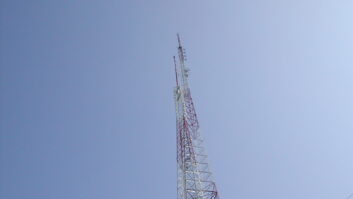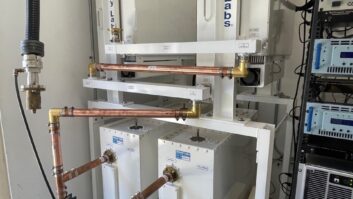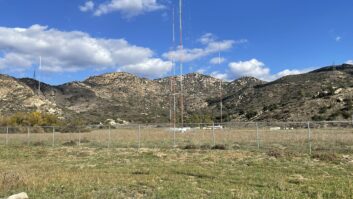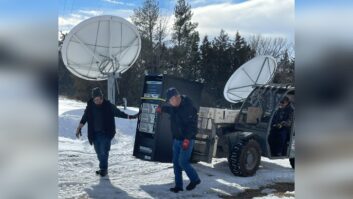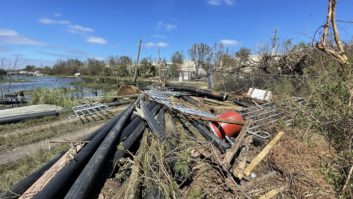Author Howard Weiss is with the law firm Fletcher Heald & Hildreth, on whose blog this article originally appeared.
A broadcast construction permit comes with conventional expectations. The permittee is expected to build the facilities specified in the permit and to do so by the deadline specified in the permit; once constructed (presumably on a permanent basis), those facilities are to be utilized in the ongoing, continuous operation of the station; and a license application reporting the successful and timely completion of the construction is to be filed. Many permittees, probably the vast majority, do what they’re expected to. Others, however, try to get around the construction requirement by setting up facilities that don’t meet the specs of the permit and are at best temporary; those permittees crank up their here-today-gone-tomorrow gear briefly, so they can at least say it was operational for a while; and they then file an application for a covering license based on those facilities.
The Audio Division has some bad news for folks who go that route.
Faced with a permittee who had sought a license apparently based on the construction of temporary, non-compliant facilities, the Audio Division has made unequivocally clear that “temporary facilities fail to satisfy” the relevant rule regarding construction. As a result, if the staff determines that only temp facilities have been constructed prior to a construction permit’s expiration date, the permit will be deemed to have expired automatically as of that date and the erstwhile permittee will be left empty-handed.
The permittee in this case held a noncommercial FM permit issued in December, 2010, with an expiration date of December 8, 2013. On December 9, 2013, the permittee filed its license application certifying that the facilities had been built and the station as operating pursuant to program test authority.
But the Audio Division must have smelled a rat.
On December 13 Enforcement Bureau agents (we’re guessing at the behest of the Audio folks, but we don’t know for sure) happened to drive up to the station’s general vicinity and couldn’t find the station’s signal. They reported that to the Audio Division, which asked them to double check. Four days later the field agents were back, this time using a “specialized vehicle” because of the remote location of the transmitter site. They found no evidence of any construction at the site, which was odd because the antenna was supposed to have been installed on a 60-meter tower. They also noted that there were no power lines within miles of the site, another indicator that the permittee’s license application might not be exactly accurate. The agents also determined that the site was on land controlled by the Bureau of Land Management (BLM). A check with the folks at BLM confirmed that BLM had not authorized use of the site and would not have authorized it even if asked.
Responding to a Division inquiry, the permittee acknowledged that it had no BLM permission to construct at the site and that the facilities it had built were dramatically different from those specified in the permit. The permittee claimed that, using a generator for power, two 10-foot pipes, and a transmitter accessing programming through a laptop with an Internet hot spot, it had managed to get the station up and running on December 6, two days before its permit was to expire. (According to the permittee, it used – we’re not making this up – a “small dog house” to house the transmitter and generator.) Whatever facilities may have been built appear not to have been especially sturdy, because the permittee also reported that, sometime after the station supposedly started operation, that operation ended when “the wind was tumble the tower [sic]”, damaging the antenna.
Given all this, we should not be surprised by the outcome.
The Audio Division held that, because the construction here did not conform to the permit’s specifications, it did not constitute the required timely construction. And since the permit had expired, the permittee was out of luck and, more importantly, out of a construction permit. The ruling was premised on Section 319(b) of the Communications Act, which provides that a CP is “automatically forfeited if the station is not ready for operation within the time specified [in the CP] … unless prevented by causes not under the [permittee ’s] control.” The ruling further relied on Section 73.3598(e) of the FCC’s Rules, which states that “[a]ny construction permit for which construction has not been completed and for which an application for license has not been filed shall be automatically forfeited upon expiration without any further cancellation by the Commission.”
Further, the Audio Division explicitly held that the temporary nature of the construction provided “an independent and alternative basis” for its decision. In other words, even if the facilities that were constructed had technically complied with the permit’s terms, the fact that the facilities were plainly less than permanent was a separate kiss of death. According to the Division, constructed facilities are expected “to endure beyond the de minimis period necessary for it to file a license application.” Stated another way, “a facility which is dismantled shortly after a license application is filed or which is constructed without the site owner’s permission or knowledge is fundamentally inconsistent with the licensing principle.”
The bottom line: “[W]e will not award licenses to permittees who have constructed temporary facilities.”
While clear and unequivocal, that holding does have one possible loose end: The Division’s decision doesn’t define “temporary facilities”. Obviously, facilities consisting of a couple of pipes, a generator-driven transmitter and a “tower” that can be “tumble” by the wind fill that bill. But what about otherwise compliant facilities that the permittee may intend to replace sooner rather than later? If those facilities conform to the specs of the permit and allow the station to operate continuously, shouldn’t they be deemed “permanent” even if the permittee plans to swap out some of the component elements in the relatively short term? You might think so, but the decision is silent on where “temporary” ends and “permanent” begins, so caution is advised.
In any event, all permittees should take this rigorous policy to heart. Since this decision came out of the Audio Division, it applies to radio permittees; however, the same rules technically apply to TV permittees, so it would not be surprising if the Video Division were to adopt the same approach. The FCC believes that the standard construction periods provide adequate time to complete acquisition and permanent installation of the necessary equipment. Once you’ve got a permit, it’s your job to take full advantage of the time provided. Remember, while permit expiration dates may be tolled under certain extraordinary circumstances, the Commission stopped granting extensions of construction periods back in the last century.
And there’s plenty of incentive to get the facilities built out before expiration. Failure to do so means loss of the permit – which necessarily entails loss of any and all time, effort and money that went into obtaining the permit in the first place. If you cared enough to get the permit in the first place, you should care enough to finish the job.
Of course, there will probably always be some folks who prefer to take chances and play a bit fast and loose, figuring that they won’t get caught. The Division’s decision here suggests that the staff may now be on the look-out for such players. “(The permittee in this particular case seems to have been on the staff’s radar already because of problems with other LPFM applications which had been dismissed for various reasons; those applications prominently involved an individual who was similarly involved in the permittee here. We suspect that that factor increased the staff’s skepticism in this case.) The chances of getting caught appear to be on the rise. That’s one more good reason not to roll the dice.
Related: CIAI’s CP for KCIY Declared Expired







